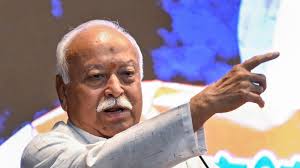NEW DELHI: An occasional nudge from a parent doesn’t do anyone harm. So when Rashtriya Swayamsevak Sangh (RSS), the mothership, speaks, the Bharatiya Janata Party (BJP) even if it doesn’t take the point knows it must listen.
So it was this Wednesday when RSS chief Mohan Bhagwat revived a long lost memory to flag the imperatives of timely retirement and modesty in public life.
The memory was of late Sangh leader Moreshwar Nilkanth Pingle, popularly known as “Moropant”, the man who, for the first time, conceived of Lord Ram as the sole source of unity for India’s disparate Hindus.
It was from his conception that the Ram Janmabhoomi movement was born. And though in public memory, LK Advani and his 1990 Ram Rath Yatra remain principal forces behind BJP’s Hindu unity project, Pingle, the pracharak who shunned publicity, was the driver behind it. Of him, RSS old timers say – “he was everywhere yet nowhere”.
And herein lay the point of Bhagwat’s Nagpur speech this week – the point that Pingle, even when felicitated on turning 75, chose to understate his achievements and make light of them. “You are presenting me with a cape when I have turned 75. I know what this means. When you wrap a shawl around a 75 year old, you are saying they’ve grown old, they must step aside and make way for others”: Bhagwat quoted Moropant, in remarks that the Congress-led opposition interpreted as RSS chief’s hidden message for Prime Minister Narendra Modi who turns 75 this September. But the 75-year remark was not the only point Bhagwat was making this Wednesday. He also spoke of how Moreshwar Pingle, even while he was being honoured, was cautious to not let trappings of pride overwhelm him.
So Bhagwat was saying much more than what was read into his speech.
His subtle message of self-effacement, as mirrored by the life of a late pracharak, could well be meant for BJP, its political protege, now in the 11th year of power at the Centre.
That prolonged spells of power can breed arrogance is well known. Not too long ago, the Congress, after decades of power, was seen as harbouring hubristic beliefs that it can never go wrong. But Narendra Modi came along in 2014 and decimated it.
Perhaps Bhagwat’s high-on-symbolism speech, making waves in political circles today, was nothing more than a mentor’s message to the mentee that humility in high echelons of power was a virtue worth nurturing, like Moreshwar Pingle did.
The man behind Sangh Parivar’s landmark projects — finding the route of the ancient Saraswati river, strategies like Ekatmata Yatra and Ram Janmabhoomi Movement, Moropant was content to stay in Sangh’s shadows, far from fame and fortune.
Appointed chief organiser of the Ekatmata Yatras after the 1981 mass conversion of Hindus in Tamil Nadu’s Meenakshipuram, he went on to lead the 1984 Ram Janki Rath Yatra – a precursor to the Ram Janmabhoomi movement.
It was this yatra that, for the first time ever, depicted Lord Rama behind silver and gold bars, in replication of the sight at Ayodhya.
By the time UP’s Faizabad court ordered the Babri Masjid gates opened in 1986, allowing Hindus to worship inside the disputed structure, ground was already ripe for the saffron party’s Ram Janmabhoomi resolution.
While the BJP went on to reap electoral dividends, the man, who engendered the Hindu unity project, passed unsung into the annals of RSS history.
This Wednesday, Bhagwat was only recalling a lost memory to signal to the Sangh parivar the many virtues of detachment.


